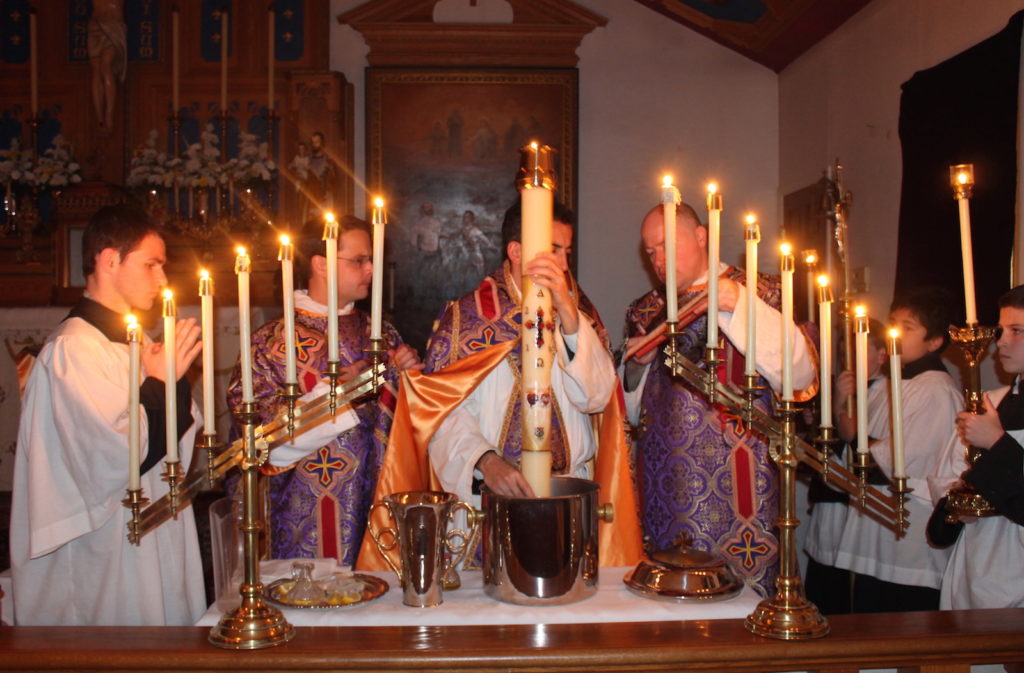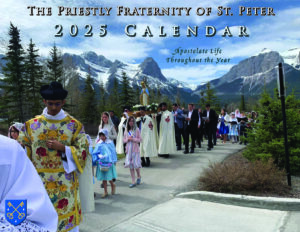Sacraments and Sacramentals
by Fr. William Rock, FSSP
One often hears that the Sacraments work ex opere operato (i.e. by virtue of the action itself) while Sacramentals work ex opere operantis (i.e. by virtue of the one performing the work).
While this is a helpful way to distinguish the modes in which they work, stating that Sacramentals work ex opere operantis does not fully capture how Sacramentals produce their effects for the ones who use them. But before exploring that point more fully, it is important to have a clear idea of what a Sacramental is.
The Sacraments are outward signs instituted by Christ which confer grace. According to St. Thomas Aquinas, the Sacraments are also “signs in protestation [declaration] of the faith” (S.T. III, q. 61, a. 4, c). Sacramentals, for their part, are “things or actions which the Church uses in a certain imitation of the Sacraments, in order, in virtue of her prayers, to achieve effects, above all of a spiritual nature” (CIC/17, §1144).
Sacramentals, like the Sacraments, are signs of the Church’s faith, and both Sacraments and Sacramentals produce spiritual effects, albeit in different ways. Unlike the Sacraments, the Sacramentals were instituted by the Church, not by Christ.
Traditionally, Sacramentals were divided into four different classes: (1) ceremonies customarily associated with the Sacraments (e.g. the anointings with the Oils at Baptism, blessings at Mass); (2) independent religious actions (e.g. blessings outsides of the celebration of the Sacraments); (3) the religious use of blessed and consecrated items (e.g. using a blessed Rosary to pray); (4) the blessed and consecrated items themselves (e.g. Holy Water, the blessed Rosary). Generally, when one uses the word “Sacramental,” it is being used in the fourth way, to indicated a blessed or consecrated item, but as was just see the word “Sacramental” has a fuller, much more extensive meaning.

Regarding the first type of Sacramentals – ceremonies customarily associated with the Sacraments – as they are used in the Mass, the Council of Trent said the following:
And since the nature of man is such that he cannot without external means be raised easily to meditation on divine things, holy mother Church has instituted certain rites, namely, that some things in the Mass be pronounced in a low tone and others in a louder tone. She has likewise, in accordance with apostolic discipline and tradition, made use of ceremonies, such as mystical blessings, lights, incense, vestments, and many other things of this kind, whereby both the majesty of so great a sacrifice might be emphasized and the minds of the faithful excited by those visible signs of religion and piety to the contemplation of those most sublime things which are hidden in this sacrifice. (Session XXII, Doctrine Concerning the Sacrifice of The Mass, Chapter 5, The Ceremonies and Rites of The Mass.)
As was noted previously, the Council teaches that these ceremonies were instituted by the Church and even claims their use is in accordance with apostolic discipline and tradition. Additionally, what Trent said regarding the use of Sacramentals in the Mass can also be applied to the Sacramentals used in the celebration of the other Sacraments, namely that the use of these Sacramentals is in accordance with human nature and that “the minds of the faithful excited by those visible signs of religion and piety to the contemplation of those most sublime things which are hidden” within the Sacraments.
Moving from the first type of Sacramental, the remaining three are often interconnected, but not always. The second type – independent religious actions – includes those ceremonies which produce blessed objects (the fourth type) which can then be used by the faithful (the third type), but it is not always the case. Some Sacramentals of the second type (independent religious actions), such as those use to invoke blessings on persons, are used to implore God’s favor on the one being blessed without him being set aside for a religious use. The being said, however, one cannot have a blessed item to use without these independent religious actions.
When an item is blessed in one of these independent religious actions, a new relationship is formed between the item, the Church, and God. In such a ceremony, a minister speaking in the person of the Church (in persona Ecclesiæ) asks God to produce certain effects when the item is used. For example, the blessing of a Rosary reads in part as follows:
Let it [the Rosary] be endowed with such power of the Holy Spirit, that whoever carries it on his person or reverently keeps it in his home, or devoutly prays to you while meditating on the divine mysteries, according to the rules of his holy society, may fully share in all the graces, privileges and indulgences which the Holy See has granted to this society. May he always and everywhere be shielded from all enemies, visible and invisible, and at his death deserve to be presented to you by the most blessed Virgin Mary herself, Mother of God.
Two things should be noted regarding the requested effects. First, different specific effects are being requested (e.g. being shielded from enemies, being presented to God at death by the Virgin Mary). Secondly, all the intended effects are expressed as being conditional, not guaranteed. How this is conveyed in the original Latin is expressed in the English translation by the word “may”. An explanation of how a sacramental produces its effects will shed light on why these two observations are important and will also explain why Sacramentals do not work purely ex opere operantis.
Let us imagine someone goes to a store and buys a Rosary. Before it is blessed, she uses it to pray. God, looking down from Heaven, sees and thinks to Himself “she is using those beads to keep track of her prayers” and the spiritual fruit which she gains from the use of the that Rosary and saying her prayers will be dependent on the intensity of her devotion (her ex opere operantis) and God’s love for her. After a few days, she has her Rosary blessed.

The next time she uses it, God, looking down, thinks to Himself “she is using those beads to keep track of her prayers, but my Church, in the person of one of her ministers, asked that I grant certain gifts to one who uses that particular Rosary”. God then considers each of the requests made by His Church regarding the use of these Rosary beads and then fulfills them, according to His wisdom, mercy, and love. Now, not only are the effects produced dependent upon devotion of the girl praying (her ex opere operantis), but certain effects produced are also depend upon the ex opere operantis Ecclesiae as the requests made by the Church over these Beads are answered by God based, not only on His love for the girl praying, but also based on His love for His Church.
From the above, we can see that the ex opere operantis Ecclesiae effects, produced by God in conjunction with the use of the Church’s Sacramentals, are dependent upon what the Church requests for when she blesses the item and God’s own wisdom in the distribution of His gifts. This, then, sheds lights on why the blessing of the Rosary was written as it was – with the Church requesting, but not guaranteeing, certain effects. To further illustrate this point, The Old Catholic Encyclopedia states the following:
The special virtue recognized by the Church and experienced by Christians in the Sacramentals consists in the official prayers whereby we implore God to pour forth special graces on those who make use of the Sacramentals. These prayers move God to give graces which He would not otherwise give, and when not infallibly acceded to it is for reasons known to His Wisdom. God is aware of the measure in which He should bestow His gifts…All the Sacramentals have not the same effect; this depends on the prayer of the Church which does not make use of the same urgency nor have recourse to the same Divine sources of merit. (s.v. Sacramentals)
The different ceremonies used by the Church explain why the use of one blessed item (say Blessed Salt) is said to produce different effects when compared to the use of another item (say a Rosary). Additionally, this means that when there are different ceremonies and prayers used in the blessing of similar items, say two Rosaries blessed using different ceremonies and prayers, the possible divine favors associated with the use of one will be different from the divine favors associated with the use of the other. Not all blessings are the same, nor do all blessings request God to provide the same divine gifts. It is advantageous to the faithful, then, not only to have their items blessed, but also to ensure that the blessings used fully express the specific effects the Church wishes to attach to each different type of item in order to ensure that the greatest possible spiritual benefit, from the reverent and devout use of their Sacramentals, may be received.
Fr. William Rock, FSSP was ordained in the fall of 2019 and is currently Assistant Pastor at Mater Misericordiae parish in Phoenix, AZ.
October 12, 2020








